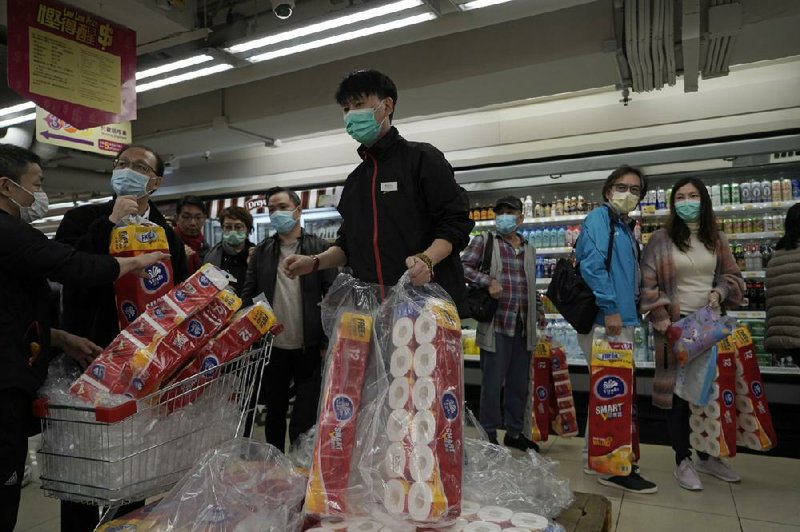BEIJING -- Infections and deaths from the new virus in China ballooned for a second straight day Friday as officials near the epicenter of the outbreak struggled to keep up with a backlog of patients' lab work.
The acceleration in cases was not an indicator of a surge in the illness covid-19 because the hardest-hit province of Hubei and its capital of Wuhan changed the way they counted cases. But public health experts wrestled with what exactly could be deduced from the numbers given the shift in approach.
"If you change the way you count cases, that obviously confounds our capacity to draw firm conclusions about the effectiveness of the quarantine," said Dr. William Schaffner, an infectious disease expert at Vanderbilt University in the United States. "We have to interpret the numbers with great caution."
Confirmed cases of the virus rose to 63,851 in mainland China, an increase of 5,090 from a day earlier, according to the National Health Commission. The death toll stood at 1,380, up 121.
[Video not showing up above? Click here to watch » https://www.youtube.com/watch?v=lRJsCr39f44]
Still, the World Health Organization continued to report lower numbers, standing by the way cases were counted before Hubei's shift. WHO pressed for more details Friday on the change in tabulating cases. Doctors in Hubei are now making diagnoses based on symptoms, patient history and chest X-rays instead of waiting for laboratory confirmation.
"We're seeking further clarity on how clinical diagnoses are being made to ensure other respiratory illnesses including influenza are not getting mixed into the covid-19 data," said WHO Director General Tedros Adhanom Ghebreyesus.
Meanwhile, the United States has expressed deep concern about North Korea's vulnerability to the outbreak and said it was ready to support efforts by aid organizations to contain the spread of the illness in the impoverished nation.
North Korea, which is China's neighbor and close ally, has moved to strengthen quarantines and other preventive measures to protect itself from the illness.
North Korea has yet to report a case of covid-19, but state media have hinted that an uncertain number of people have been quarantined after showing symptoms. Experts say an epidemic in North Korea could be dire because of its chronic lack of medical supplies and poor health care infrastructure.
"We strongly support and encourage the work of U.S. and international aid and health organizations to counter and contain the spread of coronavirus in the DPRK," State Department spokeswoman Morgan Ortagus said in a statement, referring to North Korea by its formal name, the Democratic People's Republic of Korea.
"The United States is ready and prepared to expeditiously facilitate the approval of assistance from these organizations."
North Korea's media have described the fight against the illness as a matter of "national existence." It has shut down nearly all cross-border traffic, banned foreign tourists, intensified screening at airports, harbors and other land entry points, and mobilized about 30,000 health workers to monitor residents and isolate those with symptoms.
South Korea withdrew dozens of officials from an inter-Korean liaison office in a North Korean border town after the North insisted on closing it until the epidemic is controlled.
The North this week also announced it will impose a monthlong quarantine for all foreign visitors and others suspected to have the virus. The Russian Embassy in Pyongyang previously said North Korea had imposed a 15-day quarantine on foreign visitors.
The International Federation of Red Cross and Red Crescent Societies has said its branch in North Korea has mobilized 500 volunteers in areas close to the Chinese border to assist doctors in house-to-house screening and promoting personal hygiene. Volunteers are also using hundreds of bicycles to reach North Korean households in remote areas and raise awareness of the virus, the IFRC said.
In China, the vulnerability of health workers responding to the epidemic was crystalized with other data. More than 1,700 medical workers in China have contracted covid-19 and six have died, according to the health commission, which said it was "highly concerned" by the infections.
[Gallery not loading above? Click here for more photos » arkansasonline.com/215virus/]
WHO echoed that, with Tedros saying more information was needed on when the workers were infected and under what circumstances. Transmissions to front-line health workers can signal problems in infection control policies and signal that a disease is becoming more easily transmissible.
Information for this article was contributed by Ken Moritsugu, Matt Sedensky, Maria Cheng, Ralph Jennings, Mari Yamaguchi and Kim Tong-Hyung of The Associated Press.
A Section on 02/15/2020
